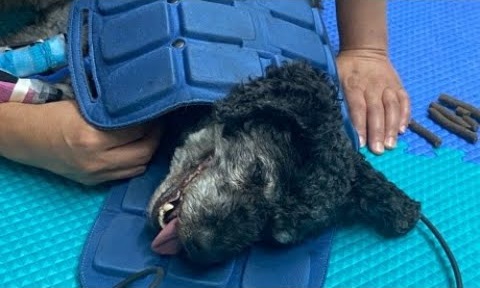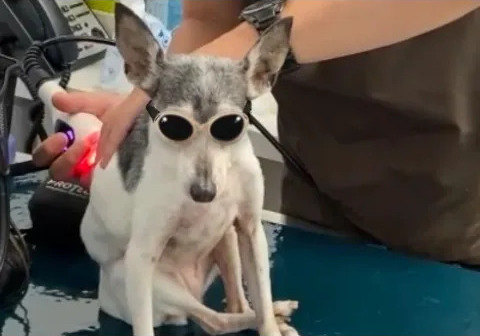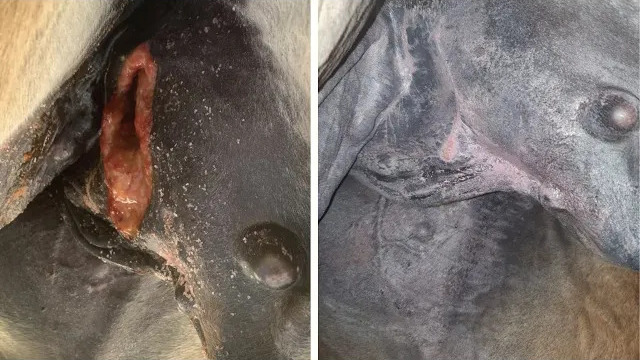MLS® Laser Therapy Case Study
Anis, Dog with Paraparesis Due to Accident
Species: Dog
Breed: Mixed
Gender: Female
Age: 1 years old

Clinical Case
Hit by a motorcycle one month previously, resulting in a sudden onset of non-ambulatory paraparesis, the hind limbs are brought into an extended position under the abdomen.
Previously treated with traditional therapy (NSAIDs, antibiotics) with no evident improvement
Clinical Examination
- Inability to assume and maintain her stance
- Severe non-ambulatory paraparesis with trailing hind limbs
- Serious myotrophy to thigh and rump muscles
- Bilaterally absent hind limbs proprioceptive positioning
- Bilaterally absent hind limb flexor reflex, L1-L5 panniculus reflex absent, no response and sensitivity at L6-Cd level, weak L7-S1 response.
Bilaterally present hind limb tenderness. - No tail movements, no sensitivity on tail tip pressure
- Bladder and bowel incontinence
- Presence of right hind limb trochanteric sore
TCVM (Traditional Chinese Veterinary Medicine) Clinical Exam
- Sensorium status alert, fearful, anxious, nervous, unpredictable, bored animal, unable to stay calm and still for long, playful (constitution: fire)
- State of the Shen: good
- Ear: warm
- Tongue: Moist pink/red
- Heartbeat: slow-strong (weaker on the left)
- Distal end of hind limbs: warm
- Body temperature on palpation: hot
- No desire to drink
TCVM Diagnosis
- Spinal cord Qi and blood stasis and kidney Qi and Yin deficiency
Treatment
- Resolve Qi/blood stasis to return to proper Qi/blood flow, reduce pain and resolve paresis/paralysis
- Tone Kidney Yin to nourish the intervertebral discs
- Tone Kidney Qi to resolve paresis/paralysis
Laser Acupuncture Protocol
| Acupoints | Indications | Freq / Joules / Time | Methods |
|---|---|---|---|
| GV-20 / Bai-hui | Permission point | 584Hz / 1.5J / 10 sec | Sedation |
| BL-11 | Influential point of the bones | 1168Hz / 1.4J / 7 sec | Toning |
| BL-17 | Yin Deficiency | 1168Hz / 1.4J / 7 sec | Toning |
| BL-22 | Shu point of the back for the triple heater (triple hearth), back pain | 1168Hz / 1.4J / 7 sec | Toning |
| BL-23 | Shu point of the back. Kidney Yin deficiency, hind limb paresis paralysis | 292Hz / 1.4J / 7 sec | Shu point of the back |
| BL-28 | 1168HZ / 1.4J / 7 sec | Toning | |
| BL-35 | Tail paralysis | 1168Hz / 1.4J / 7 sec | Toning |
| BL-39 | Urinary incontinence | 1168Hz / 1.4J / 7 sec | Toning |
| BL-40 | Urinary incontinence, hind limb paresis paralysis | 1168Hz / 1.4J / 7 sec | Toning |
| BL-54 | Master point. Hind limb paresis, muscle atrophy | 1168Hz / 1.4J / 7 sec | Toning |
| Kid-1 | Urinary incontinence | 73Hz / 2J / 10 sec | Jing-well point |
| Kid-3 | Kidney yin deficiency (Yuan source point) | 146Hz / 1.5J / 8 sec | Yuan source point |
| Kid-7 | Mother point for pattern deficits, hind limb paresis paralysis | 1168Hz / 1.4J / 7 sec | Toning |
| ST-36 | GIT and abdomen master point, constipation | 1168Hz / 1.4J / 7 sec | Toning |
| SP-6 | Master point for the caudal abdomen and the urogenital tract | 1168Hz / 1.4J / 7 sec | Toning |
Therapeutic Protocol
- Laser therapy with acupuncture for 6 months
- Treatment frequency: 1x/week for 4 weeks then every 15 days for 8 times
- Frequencies used: 584Hz, 1168 Hz, 292 Hz. 21 Acupoints, 8 sec/point, 1.5 J/cm2
- Duration of treatments: 4 months (total 13 sessions)
Results
3rd therapy:
- able to stand on her hind legs
- tries to walk 1-2 steps
5th therapy:
- maintains its stance for eating and drinking
- initial tail wagging
- urination control
- wound healing with reduction of dimensions
7th therapy:
- walks independently on all 4 limbs, incoordination persists sometimes
- Control of urination which is back to normal
- Dry and small wound
8th therapy:
-
- maintains stance, able to walk and run slowly on all 4 limbs, ataxia and incoordination persist
- Hind limbs brought to correct position (not in flexion)
- Further reduction in the size of the lesion which presents partial re-epithelialisation of the wound bed
- Active and spontaneous tail wagging with the ability to lift the tail
- Improved muscle tone
Courtesy of Dr Wita Wahyu Widyayandani, Semer Vet Clinic – Bali, Indonesia



